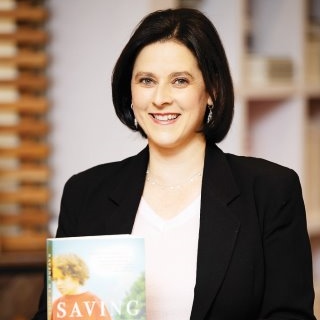
News

Throwing the book at autism: a mother’s journey
GILLIAN KLAWANSKY
In her book Saving my Sons: A Journey with Autism, Gerschlowitz, with the help of journalist Marion Scher, reveals how she and her family turned apparent darkness into light.
“Goodbye and good luck.” That was what Gerschlowitz and her husband, Martin, were told when their firstborn son, David, was diagnosed with autism at the age of 20 months.
“We were basically told, ‘Accept it, make him comfortable, there’s nothing you can do’,” she says. A qualified attorney, Gerschlowitz put on her research hat, and sought solutions.
The couple sought treatment options in the United States, drawing on the work of top international experts. “We weren’t willing to give up on our son or accept that he would have no future,” she says. “I discovered that autism is a treatable medical illness, and it doesn’t always have to be a lifelong disability.”
This was a revelation. “We learnt about a gut-brain connection, which is undeniable. Doctors in America were successfully treating children with autism by treating the gut to heal the brain. When I suggested this to the South African medical profession, I was dismissed.”
Finding the right education was also key. “I went from school to school to school,” she says. “In South Africa, we tend to box children – mainstream, remedial, special needs. In Australia and the US, there is a more integrative approach.
“When David was seven, I met a woman in Chicago, Dr Doreen Granpeesheh, who introduced me to a teaching methodology called Applied Behaviour Analysis (ABA),” she says. “Once we placed David on her ABA programme, we started to see progress. ABA is a teaching methodology endorsed by the US surgeon general and the American Academy of Paediatrics, and is covered by medical insurance in 49 states. If it didn’t help children, why would they pay for it? There is no cover for it in South Africa.”
Gerschlowitz brought ABA to South Africa, and launched the Star Academy 10 years ago. It now offers educational instruction to a wide range of children on the autism spectrum, and those fighting oppositional defiant disorder and ADHD.
“David’s battleground has laid the path to recovery and healing for many children with autism on the African continent,” she says. Through the academy, they are now servicing children in African countries including Zambia, Mauritius, Ghana and elsewhere.
Gerschlowitz has long wanted to write a book to share her experience and expertise, and show the importance of maintaining hope when it seems all is lost. Writing the book took her and Scher 18 months. “I would write, and Marion would edit. She gave me confidence. Through her polishing, she helped make my words come alive.
“I wrote the book to break down barriers for other families trying to access the right treatment for their children,” says Gerschlowitz.
“I wanted to dispel the archaic notion that autism has to be a lifelong disability, to give parents whose children are now receiving an autism diagnosis a roadmap and a way forward. They are where I was 15 years ago. My advice to these parents is that autism means game on, not game over. Put on your boxing gloves, and fight for your child. Autism is a treatable and recoverable diagnosis.”
While autism has a wide spectrum, ranging in severity, all sufferers have two things in common: deficits in communication, and the ability to fit into social settings. “You can have a child that can’t talk at all, and you can have a child who can talk, but is struggling to establish and maintain friendships,” says Gerschlowitz. “Early intervention is key, but it’s never too late to start treatment. Autism left untreated can strip a child of the basic skills to function as a human being.”
She says recovery means that the child is in a mainstream school with no facilitation, and he or she has scored average to above average on their IQ. “Recovery means that the child is indistinguishable from their peers,” says Gerschlowitz. “Not every child will fully recover, but we can work towards the child’s functionality and independence.”
In sharing her personal story, Gerschlowitz shows that she’s been there, and come out stronger. “In the beginning, we were in shock. We went into survival mode. We were so afraid of the unknown, and the grief we experienced was unimaginable. I wrote the book so that family members and other professionals understand what autism can do to a family.
“I want them to understand the brokenness. I talk about the sadness, and the heartbreak, but I also talk about victories along the way. My older son still wrestles with autism every single day. We will never give up trying to restore his health and functionality, even though he’s 17 now. There’s a message of hope.”
Gerschlowitz has three sons, and has seen all sides of autism. “My older son still battles, the second one escaped autism, and the other son recovered from autism,” she says. “The message of this book is that at any given point in time, we all face challenges. We must focus on the blessings in our lives, and on finding solutions, no matter whether the journey ahead appears insurmountable. If mountains need to be moved, we must move them.”





Russell Fig
June 27, 2019 at 7:46 pm
‘Could you please send me Illana Gershlowitz’s contacts?’
Carissa M
July 4, 2019 at 8:05 am
‘Please can I get a contact number for Ms Gershlowitz.’
Gillian
July 25, 2019 at 9:59 am
‘She can be contacted via the Star Academy:
https://thestaracademy.co.za/contact/‘
JILL E KAGANSON
July 31, 2019 at 8:07 am
‘Pls could you send me Ilona Gerschlowitz’s email address. Thank you.
Or, could I ask you to pass on to her that I found her interview yesterday on CapeTalk rivetting. I send her the article below just recd.
http://www.hadassah.org/news-stories/unit-9900-autistic-teens-join-israeli-army.html‘